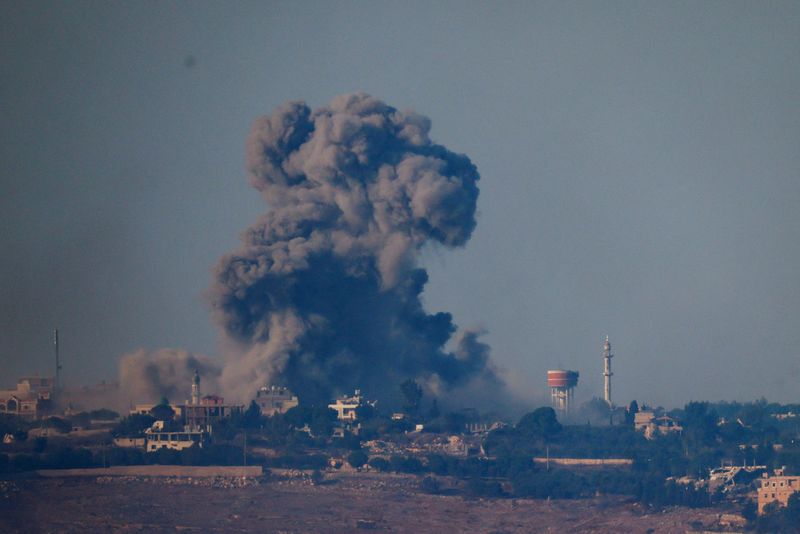By Erin Banco
(Reuters) - Lebanon's Hezbollah has been significantly degraded militarily by Israel, but the Iran-backed group will likely try to rebuild its stockpiles and forces and pose a longterm threat to the U.S. and its regional allies, four sources briefed on updated U.S. intelligence told Reuters.
U.S. intelligence agencies assessed in recent weeks that Hezbollah, even amid Israel's military campaign, had begun to recruit new fighters and was trying to find ways to rearm through domestic production and by smuggling materials through Syria, said a senior U.S. official, an Israeli official and two U.S. lawmakers briefed on the intelligence, speaking on condition of anonymity.
It's unclear to what extent those efforts have slowed since last week when Hezbollah and Israel reached a shaky ceasefire, two of the sources said. The deal specifically prohibits Hezbollah from procuring weapons or weapons parts.
In recent days, Israel has tried to undercut Hezbollah's ability to rebuild its military forces, striking several Hezbollah rocket launchers in Lebanon, bombing border crossings with Syria, and blocking an Iranian aircraft suspected of ferrying weapons for the group.
U.S. intelligence agencies assess that Hezbollah is operating with limited firepower. It has lost more than half its weapons stockpiles and thousands of fighters during the conflict with Israel, reducing Tehran's overall military capacity to its lowest point in decades, according to the intelligence.
But Hezbollah has not been destroyed. It still maintains thousands of short-range rockets in Lebanon and it will try to rebuild using weapons factories in neighboring countries with available transport routes, the sources said.
One of the lawmakers said Hezbollah has been "knocked back" in the short term and had its ability to conduct command and control reduced. But the lawmaker added: "This organization is designed to be disrupted."
U.S. officials are concerned about Hezbollah's access to Syria, where Syrian rebels recently launched an offensive to retake government strongholds in Aleppo and Hama. Hezbollah has long used Syria as a safe haven and transport hub, taking military equipment and weapons from Iraq, through Syria and into Lebanon through the rugged border crossings.
Washington is trying to pressure Syrian President Bashar al-Assad to limit Hezbollah's operations, enlisting other countries in the region to help, a senior U.S. official said. Reuters reported on Monday that the U.S. and the United Arab Emirates have discussed possibly lifting sanctions on Assad if he peels himself away from Iran and cuts off weapons routes to Hezbollah.
Hezbollah officials have said the group will continue to function as a "resistance" against Israel, but its secretary general Naim Qassem has not brought up the group's weapons in recent speeches, including after the ceasefire was reached. Sources in Lebanon say Hezbollah's priority is rebuilding homes for its constituency after Israeli strikes destroyed swaths of Lebanon's south and the southern suburbs of Beirut.
The U.S. National Security Council and the Office of the Director for National Intelligence declined to comment on the updated U.S. intelligence.
TRAINING CHALLENGES
Iranian Foreign Minister Abbas Araqchi said last week that Hezbollah had not been weakened by Israel's killing of many of its leaders since January and by its ground assault against the group since early October. He said Hezbollah had been able to reorganize and fight back effectively.
However, U.S. intelligence indicates that Israel has taken out thousands of Hezbollah's missiles in Lebanon, pushing cadres of its fighters back from the border with Israel, the sources told Reuters.
While tracking the exact number of Hezbollah fighters remains a challenge, the intelligence notes that the group will likely face significant training challenges for years to come, the sources said.
U.S. officials say Hezbollah's breakdown points to a growing gap in Iran's military capacity and raises doubts about its ability to use its proxies to attack Israel and its other adversaries in the short term. Iran also backs Hamas militants in the Gaza Strip and the Houthi group in Yemen.
In the past, had Israel considered bombing Iran, it faced the prospect of Hezbollah in Lebanon reciprocating, said a second U.S. official, but with Hezbollah weakened, Israel can attack Iran directly without the same threat to its north.
In Gaza, U.S. intelligence indicates Hamas can only sustain small, guerrilla-style tactics after having lost at least half of its fighters. The Houthis continue to launch missiles and drones from Yemen, but the U.S. has been able to intercept most.

The updated U.S. intelligence - briefed to senior officials and lawmakers in recent weeks - emerges ahead of U.S. President-elect Donald Trump's Jan. 20 inauguration. The U.S. charged an Iranian man last month in connection with an alleged Iranian plot to assassinate Trump. Iran has rejected the accusation.
During his first term in office, Trump embraced a "maximum pressure" campaign on Iran, imposing harsh sanctions on Tehran, its military complex and its most lucrative economic sectors. Trump in 2018 pulled the U.S. out of a 2015 international agreement meant to deny Tehran the ability to build nuclear weapons. In 2020 Trump was responsible for a strike in Iraq that killed top Iranian military commander Qassem Soleimani.
